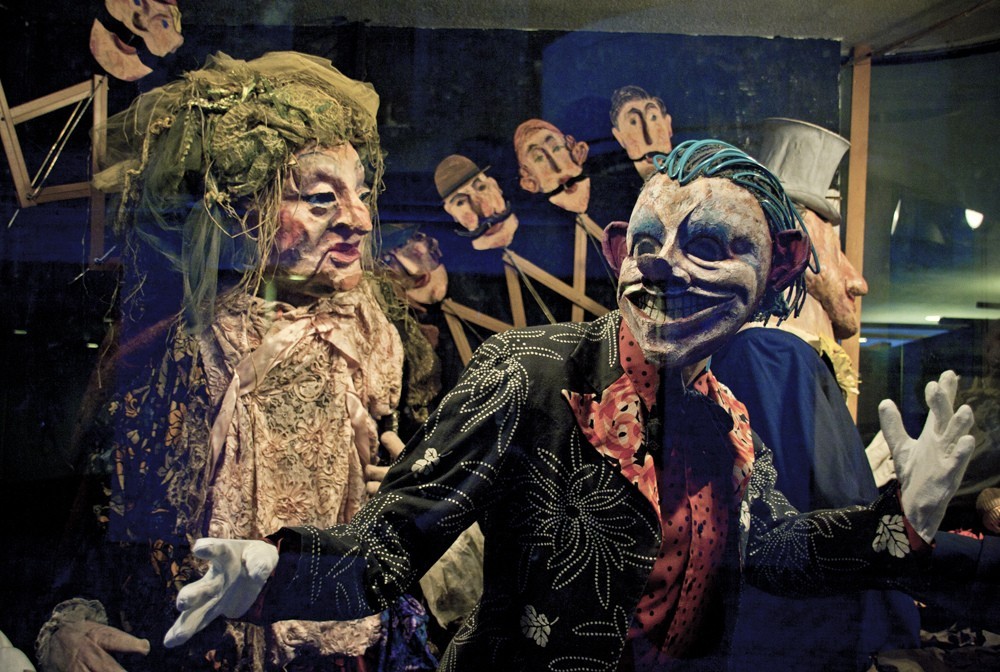A Final Checklist Before You Print up Your Play
If you follow these time-tested dramaturgical rules, your play is sure to be a hit.
1 – FINDING YOUR PUPPET
Your play must have at least one character that could be played by a puppet. Maybe the mother. Maybe a judge. I don’t know. Definitely the dog. It doesn’t need to be the lead; in fact it probably shouldn’t be the lead. I’m not saying you have to sit down and write a puppet play. You should write your play for humans, if that’s what you want to do. But if a puppet could not possibly play any of the characters in your play, then it’s back to the drawing board for you.
Corollary: It must be possible for all actual objects to be replaced by mimed objects.
2 – DO YOU WANNA DANCE?
After a long day of playwriting, you’re asleep in your bed, dreaming of the future. In your dream your play has opened at a major theatre and it’s a sold-out hit. Now you’re at home, waiting for the phone to ring. If you are a playwright worth your salt, and you’ve done your job properly, you’re not waiting for some big-time film producer to call. You’re dreaming of a choreographer. Not necessarily ballet—although, why not! Maybe something avant-garde. The phone rings. The voice on the other end says, in a Quebecois accent, “I want to option your play, cut all the lines, and turn it into a dance piece.” You wet your bed.
3 – FALLEN STAR
If your lead actor gets sick or quits, your play should be totally fucked, because your script will be packed with so many weird and fancy and crafty things for this actor to do. So many skills (e.g. sword fighting, singing, Morris dancing), so much plumbing of emotional depths (e.g. minutely dissecting and laying bare a lifetime of dysfunction with mother, a complex and humiliating whole-being immersion in failure), so many baroque turns of phrase, and weird mental chasms to bridge. This actor will be holding on to his or her performance for dear life, by the tips of his or her fingers. If your play is up to snuff and your lead actor breaks his or her leg, you will have to cancel the run.
4 – BEYOND THE WORD “JUST”
Here’s a good test of your play’s mettle. During rehearsals, or during a workshop, say, an actor asks a question. “Why does my character go into the bathroom?” If your answer contains the word just—as in, “She just needs to go poo”—your play is doomed. The correct answer must always be in the order of: “The presence of his mother has caused him to lose control of his bowels,” or “His mother has turned the living room into a moonscape, and the only place with oxygen is the bathroom,” or “She deserves the toilet.” Even if, deep inside, you know the answer to “Why does my character eat the falafel?” is “She’s just hungry,” you’d better muster up the courage to fake a better one. Such as, “She must feed the mother-shaped love-beast that is gnawing at her insides.”
5 – GASPING FOR AIR
An audience comes to the theatre expecting to be bored. We must aim higher. There should be at least one moment in every performance when the audience audibly gasps. Better yet, a moment when at least one person screams “HOLY FUCK!!! I DID NOT SEE THAT COMING!!!” A simple trick is to comb through your script, find all the “Hmmmm” moments, the quietly nodding “Ah yessssss, I get it” moments, and replace them with “WHAT THE FUCK JUST HAPPENED?!” moments. For example, if you have a scene where the mother pours the son a glass of wine and the audience (nodding) goes, “Ah yessssss, much the way Siegfried pours wine for Gunther in act one of Götterdämmerung by Wagner,” you are dead in the water. Replace it immediately with a “SHE KNOOOOWS HE’S AN ALCOHOLIC, HOLY FUCK, SHE’S EEEEVIL!!!” moment. Or, when the son returns at the end of the play, “Hmmmmm [nodding, rubbing chin] the prodigal returns” = bad. “ARRRGH [shitting pants, running out of theatre] I THOUGHT HE WAS DEAD!!!!” = good.
Corollary: Walkouts are to be desired. Not everyone all the time. But one or two a week? Niiice.
6 – FIRST IMPRESSIONS
If your reaction to the first read-through of your script is “This is either going to be mind-blowingly great or a humiliating end to my career,” you’re in good shape.
7 – THE SILENCE IS DEAFENING
You may write pauses and silences into your play, but be warned: This is an invitation for audience members to unwrap candies. Or to send a text message. Or to chat amongst themselves. This is not the end of the world. Remember: In the first-ever production of Hamlet, the people in the pit were fornicating and selling oranges. Audience members were even known to lift their skirts and take dumps off the balcony (no joke). So, either cut your pauses, or make everything else so off-the-charts exciting that if, during the pause, someone yells, “Blimey, guv, ye want te buy a bleedin’ orange?” it’s no big deal. At the very least, I think your pauses should be able to withstand a little coughing or Werther’s-unwrapping in the audience, don’t you?
Good luck, and see you on opening night!










Comments